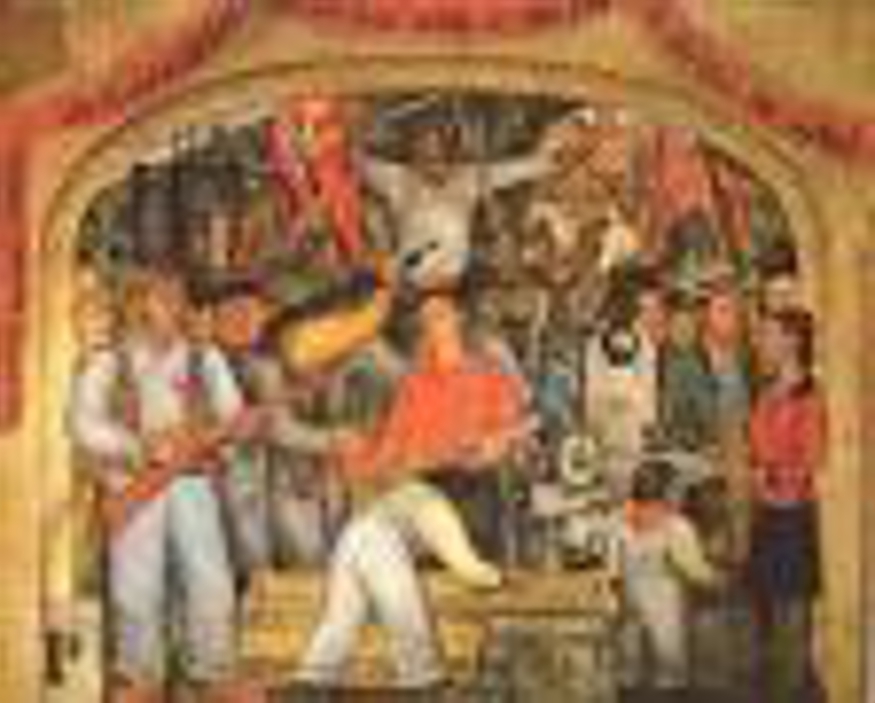UNITED STATES—When I first brought my newly published book to Los Angeles, a year and a half before, it was a great moment. Years earlier Antonio had seen a college student barely able to speak a sentence in Spanish and now I had written a book, “Un invierno en el infierno,” (its Spanish title). Antonio was the first person to ask me to sign a copy.
The request took me by surprise: ‘You mean I write a book,’ I thought, ‘and you still want me to sign it!’ Also, Antonio gave me a pointed critique, “You should write something in more popular language.” The sharp point of this was soothed by gifted books, treasures from the dark shelves of that little book store, some Nietzsche and the poems of Ramón López Velarde (If you think Darío is candied and rare try López Velarde).
When I first brought my book it somehow triggered Antonio to open up about his past. When he had been a young man in Mexico arrived in the capital from the province, he worked as an assistant to Diego Rivera. Mixing the plaster for the frescoes, measuring and heavy lifting involved in making a mural. And he got to know Frida Kahlo. And on this day in the summer of 1988, he took a book off a personal shelf in the book store and showed a colored plate inside: there is Antonio as a teen in a newsboy cap in the Ministry of Education mural.
“Diego painted me carrying a copy of ‘Kapital,’” Antonio said.
Trotsky was exiled in Mexico City, in Coyoacán the sleepy suburb where Frida’s family home was. From Moscow Stalin had the exiled leader in his crosshairs. It was the young Antonio in overalls who helped put bricks in the high windows of Trotsky’s house, so it could be immune to gunshots and explosives. Eventually, the house was targeted for two attacks, one directed by David Siqueiros, who was a Stalinist. Antonio smiled at the assertion of Frida’s biographers that Trotsky and Frida had been lovers. “He was under guard 24 hours a days.”
“Diego didn’t know what to do with Frida when he was painting,” Antonio recounted. “The driver, Frida and I sat outside, drinking shots of tequila. Now they say she was against the United States because of her politics, but she was really quite struck by it. Once she had a little toy battleship with flags on it. Frida was delighted by that. I was naïve, I think sometimes Frida was coming on to me, but I didn’t recognize it in my innocence.”
In telling me about his past, Antonio left teachings about art: “Diego loved publicity and said that the artist has to keep themselves alive in the public’s mind.” Of course, Frida too, did a pretty good job of this.
Antonio came to the meetings of Bohemia with his guitar. His boleros, romantic sentimental songs like “Bésame Mucho,” and Agustín Lara were a treat. He’d take off the jacket of his customary black or gray suit and play, sometimes on leg on the chair and his resonant voice, perfected by cigarette smoking, elicited sighs and catcalls.
It would already be dark outside over West Adams and there might be some wine or coffee. Antonio himself left alcohol behind when he was 60; he looked at himself in the mirror one morning and decided there would be no more for him. Philosophically he still recognized the psychological and creative benefits alcohol provides by altering one’s perspective.
The years passed and I was living on the other side of town—that alone will separate you from people in this immense city. Parkinson’s Disease began to alter Antonio’s body in subtle ways at first. On the phone he sounded fine. More years passed.
One Saturday in 2010, I drove downtown to an educational conference where I was to speak. I went very early, 7:30 in the morning, so I drove by the old neighborhood. Estrella Avenue was swept clean and still shadowed by dawn. Sun gilded the rooftops. Empty. Not a living soul to link to the life I had known at 1980: the house, a bright new aquablue, silent; there was the cement footbridge over Figueroa, where cartridges would appear after some gang shenanigans.
I knew that after the conference I would stop by Librería Azteca. I also knew that Antonio had died though nobody told me so. A few moments I sat there in my car by the curb on Adams and hesitated to get out. But I had to go inside and talk to his daughter. Antonio was the first person I knew to be a victim of “death by Los Angeles;” the city’s immensity and the rat-race swallow up dear lives whole despite the best of intentions. They become half dead to us while we’re still alive. And so it was. Antonio had died a few months earlier on Valentine’s Day, 2010.
Humorist Grady Miller is author of the humor collection, “Late Bloomer,” available on Amazon. Grady can be reached at grady.miller@canyon-news.com.






